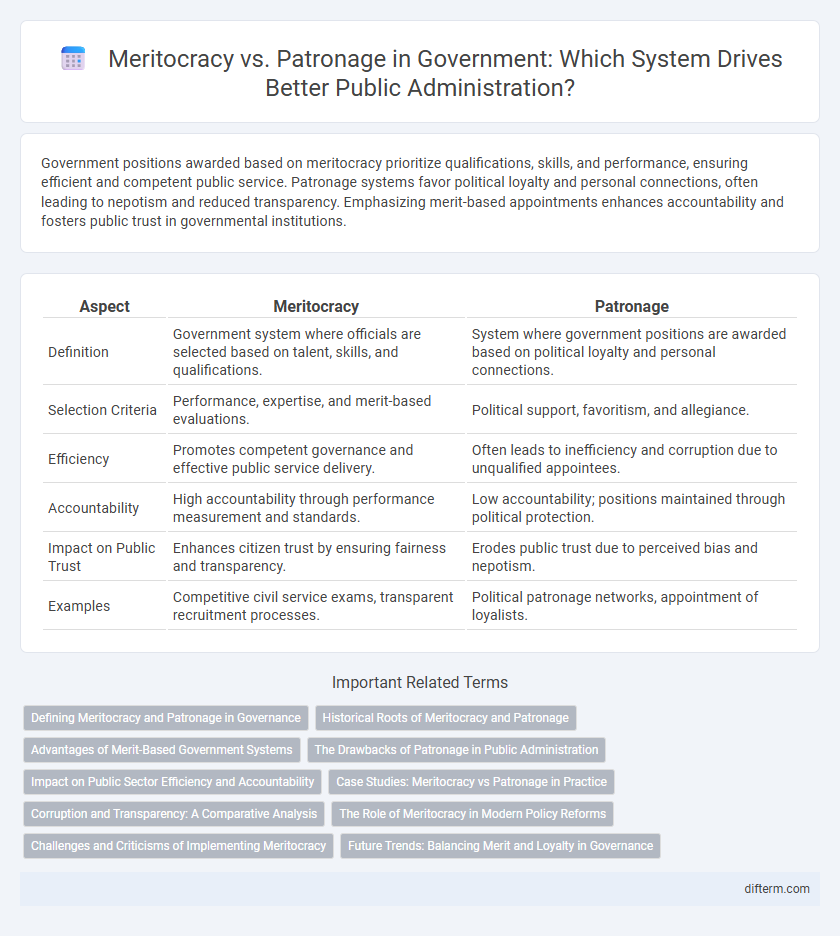Government positions awarded based on meritocracy prioritize qualifications, skills, and performance, ensuring efficient and competent public service. Patronage systems favor political loyalty and personal connections, often leading to nepotism and reduced transparency. Emphasizing merit-based appointments enhances accountability and fosters public trust in governmental institutions.
Table of Comparison
| Aspect | Meritocracy | Patronage |
|---|---|---|
| Definition | Government system where officials are selected based on talent, skills, and qualifications. | System where government positions are awarded based on political loyalty and personal connections. |
| Selection Criteria | Performance, expertise, and merit-based evaluations. | Political support, favoritism, and allegiance. |
| Efficiency | Promotes competent governance and effective public service delivery. | Often leads to inefficiency and corruption due to unqualified appointees. |
| Accountability | High accountability through performance measurement and standards. | Low accountability; positions maintained through political protection. |
| Impact on Public Trust | Enhances citizen trust by ensuring fairness and transparency. | Erodes public trust due to perceived bias and nepotism. |
| Examples | Competitive civil service exams, transparent recruitment processes. | Political patronage networks, appointment of loyalists. |
Defining Meritocracy and Patronage in Governance
Meritocracy in governance emphasizes selecting and promoting officials based on skills, qualifications, and performance to ensure effective and efficient public service. Patronage involves appointing individuals to government positions as rewards for political support or loyalty, often disregarding merit or competence. The distinction between meritocracy and patronage significantly impacts transparency, accountability, and public trust in government institutions.
Historical Roots of Meritocracy and Patronage
Meritocracy in government traces its roots to ancient China's imperial examination system, established during the Sui Dynasty (581-618 AD) to select officials based on ability rather than birthright. Patronage systems, conversely, date back to classical Athens and the Roman Republic, where political loyalty and personal connections determined appointments and distribution of resources. These historical foundations shaped the evolution of governance models, contrasting competence-based promotion with loyalty-based favoritism.
Advantages of Merit-Based Government Systems
Merit-based government systems ensure the selection of public officials based on qualifications, expertise, and performance, leading to increased efficiency and effectiveness in policy implementation. This approach minimizes corruption and nepotism by prioritizing competence over personal connections, fostering transparency and accountability in governance. Evidence shows meritocracy enhances public trust and promotes equitable opportunities for skilled individuals, driving sustainable socio-economic development.
The Drawbacks of Patronage in Public Administration
Patronage in public administration often leads to inefficiency and corruption, as appointments are based on loyalty rather than merit. This practice undermines institutional integrity and erodes public trust by prioritizing political connections over competence. Consequently, patronage can impair the delivery of quality public services and hinder effective governance.
Impact on Public Sector Efficiency and Accountability
Meritocracy in government promotes public sector efficiency by ensuring that hiring and promotions are based on qualifications and performance, leading to a more competent workforce. Patronage systems undermine accountability by prioritizing political loyalty over merit, resulting in inefficiency and increased corruption risks. Empirical studies show that merit-based systems correlate with higher service quality and better governance outcomes.
Case Studies: Meritocracy vs Patronage in Practice
Case studies on meritocracy versus patronage in government reveal significant impacts on administrative efficiency and public trust. Singapore's meritocratic system, emphasizing transparent recruitment and performance-based promotion, has consistently led to improved governance and reduced corruption. In contrast, patronage-driven systems in countries like Nigeria often result in nepotism, decreased institutional effectiveness, and hindered socio-economic development.
Corruption and Transparency: A Comparative Analysis
Meritocracy in government promotes transparency and reduces corruption by ensuring that public officials are selected based on qualifications and performance rather than personal connections. Patronage systems often increase corruption risks, as appointments are made through favoritism, undermining accountability and public trust. Comparative studies show that meritocratic governance correlates with higher institutional integrity and more effective anti-corruption measures.
The Role of Meritocracy in Modern Policy Reforms
Meritocracy in modern policy reforms emphasizes recruiting and promoting government officials based on competence, skills, and performance rather than on political connections or patronage. This approach enhances efficiency, transparency, and accountability in public administration, leading to improved service delivery and policy outcomes. Empirical studies show that merit-based systems reduce corruption and foster innovation, which are critical for sustainable governance and socio-economic development.
Challenges and Criticisms of Implementing Meritocracy
Implementing meritocracy in government faces challenges such as entrenched patronage systems that prioritize loyalty over qualifications, leading to resistance from established political elites. Critics argue that merit-based recruitment may still reflect biases related to socioeconomic status, limiting true equal opportunity and perpetuating inequality. Furthermore, reliance on standardized criteria can overlook diverse talents and contextual expertise crucial for effective governance.
Future Trends: Balancing Merit and Loyalty in Governance
Emerging governance models increasingly seek to balance meritocracy's emphasis on qualifications and performance with patronage's focus on loyalty and political support. Future trends indicate the integration of advanced data analytics and AI to objectively assess competencies while maintaining mechanisms for political accountability and coalition-building. These hybrid approaches aim to enhance administrative efficiency without undermining the legitimacy and stability derived from representative loyalty networks.
Meritocracy vs Patronage Infographic

 difterm.com
difterm.com